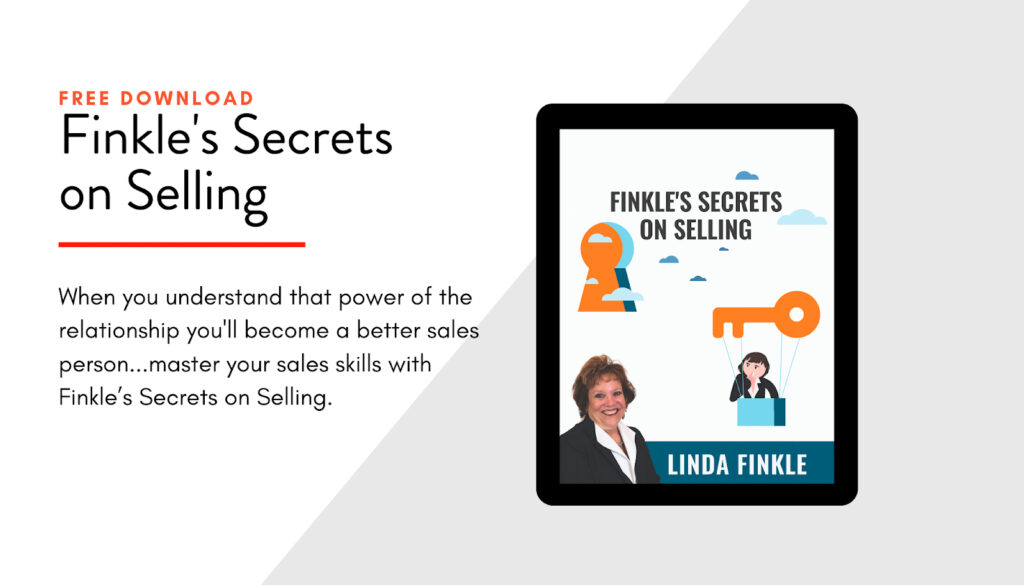There are a lot of myths about selling, sales, and business development that I want to dispel in this article.
Not everything you’ve heard is hogwash, but a whole heck of lot of it is.
I’m not suggesting there isn’t good information available, there is. What I am saying is that there is missing information (those little details that aren’t shared) or what you read or learn doesn’t go far enough, so you don’t actually have a true picture.
I’ve personally been in sales for more than 30 years and have taught literally thousands of salespeople.
I have worked with sales teams and entrepreneurs and CEOs of companies to help them build their skills and the skills of folks who work for them.
Here are 14 examples of myths about sales, selling, and business development that are costing you sales, and limiting what’s possible.
Making a sale is an event.
Too often we treat the actual sale, the signing of the contract, or the purchase of our product or service as a sale.
Technically it is, but in reality, it should simply be the logical conclusion to the end of a successful process you and the prospect have gone through together.
Closing a deal or not, is often a surprise.
Occasionally, you think a deal is going to close and it doesn’t, something happens that is totally unexpected, but most of the time you should have a good sense of whether this deal will close or not.
Selling begins when you have a prospect in front of you.
Not true. Selling begins with every interaction you have with another human being. Someone you meet today may not be a good prospect today but they might a year or two from now, or they may know someone who could be a prospect.
How you choose to be in a relationship with others whether they are a prospect or not, says a lot about you as a person and is where selling begins.
The ‘sale’ is the culmination.
Ah, no. The sale itself, when they sign the contract or hand over money is just the beginning.
What happens after the sale is where the rubber meets the road and whether this client will be a client for the long term or just a one-hit-wonder.
It’s never over until they say no.
This is simply not true. You decide when it’s time to move on. Going back to number two above, throughout the process you will be asking closing questions, determining the probability of success and what if anything you need to do to get to a ‘yes’.
Along the way you may realize that there is a very small chance the prospect will say yes.
Why keep going and spend countless hours of your time in the hopes that it will be positive? Move on to the next situation or go find another one.
You can’t sell if there isn’t a need.
Conceptually, I agree. What is not true is that all prospects recognize they have a need.
Sometimes we have to ask questions to determine if there is a need they don’t recognize. It’s a glorious ah-ha moment for them and you when they realize they have a new perspective.
If you determine your market you ‘should’ be able to close deals.
Statistically, if you have identified the market that uses your product or service you should be able to close deals. But a lot goes into the process that has nothing to do with your product or service.
Figure out your unique selling proposition that is NOT about what you are selling.
If a conversation or meeting doesn’t result in a next step it was a waste of time.
Absolutely positively NOT true. Remember, sales is not an event, it’s a process. Too often we focus on the one person ready to buy today/now and spend all of our time identifying them.
I promise you that spending an equal or even greater amount of time on business development, building relationships, and keeping in touch produces more fruit in the long term.
If you’ve been successful you’ll get referrals.
Probably if the right person comes onto the radar screen of your client, that’s true.
But you gotta ask, tell them exactly what you want in terms of referrals and help them recognize you don’t need them to vet these referrals for you, simply refer them and you’ll take it from there.
Once you are at the top, you don’t need more training.
Maybe you don’t need the same level of training, but you need training and development to push you past your current level. We all get stale, complacent, and lose our edge at times.
Even if that never happens, the best athletes, artists and anyone who wants to stay at the top of their game keeps practicing and has training.
Business development and sales are the same.
They are both important but different. You’ll find a lot of opinions on this topic, but my view is that you can do lots of business development and never sell anything, but you can’t make a sale without business development.
If you learn sales skills, anyone can be successful.
Having basic sales skills is important for sure, but this is like saying if you know the techniques and understand the different mediums for painting anyone can be an artist.
Selling is a blend of science (the skills) and art (how you do it).
Knowing your product or service well is less important than sales skills.
Wrong! I would rather have someone who has exceptional sales skills, as I can teach them about what we are selling than have a subject matter expert who can’t sell.
When you have something to offer that is unique in the marketplace, you don’t have to sell.
Okay, it is true that if you are Apple you have lines of people waiting to buy from you. But Apple sells long before their products hit the shelves.
They hype it up, are advertising and promoting and ‘selling’ for months before the product is available.
Don’t assume because you have the latest, greatest mousetrap that all you have to do is show up and the sale happens.
There are so many more beliefs that people have about sales, selling, and business development that simply isn’t true and, in fact, get in the way of their success.
I could go on with other examples and in a future article, I might.
For now, though, I encourage you to re-read each of these examples. Are you carrying around any of these beliefs? Are others in your company carrying around these beliefs, and maybe they don’t even know it?
If you can identify with even one or two of these, you are likely missing sales opportunities. Just think, if shifting your thinking around one of these fourteen examples and it helps you close one deal you wouldn’t have, what is that worth to you in terms of real dollars and your long-term success?
Want More Selling Tips?
I have created a list of my top tips that I have personally used over and over again to become a top salesperson.









